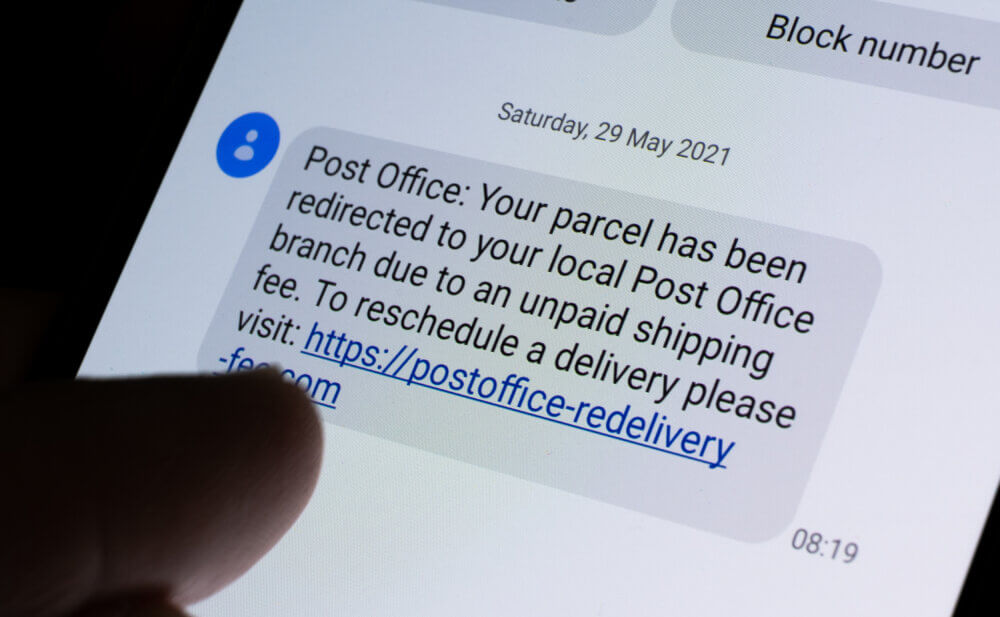Watch Out For Scams!
How to protect yourself from postal scams, telephone fraud and doorstep criminals

Scam mail
Every year, millions of people are deceived by criminals through letters and phone calls, resulting in the loss of billions of pounds globally.
With the advancements in technology, scam letters can now be easily mass-produced to resemble personal letters or important documents. This can deceive the recipient into disclosing personal information such as bank details or making money transfers.
Lottery and prize draw scams
Lottery and prize draw scams are among the most prevalent scams. The people who fall victim to these scams are informed that they have won a substantial cash prize but are required to pay a fee to release it.
Please be cautious! Legitimate lotteries or competitions will never request that you send money to receive a prize.
Clairvoyant scams
Clairvoyant scammers have no idea who will be reading their letters but show false concern and pretend they are going through a lot of trouble to give the reader good health, wealth, and happiness.
They can create imaginative stories and performing rituals, as well as detecting potential dangers.
They often blackmail victims by telling them, ‘’Bad luck will befall you if you don’t pay up’’.
Catalogue and brochure scams
Beware of scammers who send out misleading information about products such as food, pills, beauty items, jewellery, clothing, and home and garden products.
They promise prizes upon ordering but fail to deliver. Instead, they lure you with more promises to encourage additional orders. These deceptive schemes may involve receiving phone calls confirming your “win” or being instructed to look out for “important” letters. These scams originate from various countries, including the Netherlands, Belgium, France, Switzerland, and others. Stay vigilant and be cautious.
Banks and Building Society scams
Scammers can send out authentic-looking scam mail that appears to be from banks and building societies, as scammers often send them to request information and/or money. These fake emails are more common but can also be sent through traditional mail.

Debt Recovery ScamsFraudsters reach out to their targets via letter or phone and falsely state that they have acquired a debt under the victim’s name from a well-known company or utility provider. They use intimidation tactics and threaten legal action if the fabricated charges are not paid immediately.
Courier scams
Scammers call and pretend to be from your bank, claiming that your debit or credit card needs to be collected. They will ask you to hang up and call your bank to verify the request. However, they will stay on the line and pretend to be from the bank themselves. They will then ask for your PIN and send someone to collect your card, claiming it will be changed at the bank. But in reality, they will keep the card and use it to purchase goods or withdraw money from your account. Stay vigilant.
Important: Once you’ve returned the receiver, the call may still be active for up to five minutes before it ends automatically. Beware of scammers who might play a recording of the dial tone during this time. Remember, legitimate banks or police will never ask for your PIN or request a courier to collect your bank card.
PPI scams
Numerous PPI telephone scams exist, all related to payment protection insurance. Typically, scammers impersonating claims handling companies call the victim and inform them of a compensation award. However, to receive the funds, the victim is asked to provide their bank details and make a payment.
Parcel delivery scam
The victim receives a card through their door, claiming that a parcel delivery was unsuccessful and they need to call a phone number provided on the card. However, the number turns out to be a premium rate line with only a lengthy recorded message, resulting in a high phone bill for the victim.
Prize holding scam
Scammers know that all the people whose names are on the lists will already have sent money to scams and been tricked into thinking a cheque or prize is coming their way. They try to cash in again, contacting the victim and saying that an unclaimed prize is being held in their name, but a payment is required to release it.
Important: International scammers often appear to be very friendly over the phone but some use well-spoken British actors to record messages.

FAQs
Why have I been targeted?
There are two ways scammers can obtain your information: either by purchasing a mailing list that includes your details or by luring you into responding to a survey, letter, phone call, or advertisement. Once scammers trick someone, they add them to a list of victims.
What do scammers do with these lists?
Criminals across the globe purchase this personal information from scammers, increasing fraudulent emails and phone calls attempting to obtain your money.
What other tricks do scammers use?
Be wary of scammers as they are skilled at manipulating people’s minds and disrupting rational thinking. When someone becomes ‘dazzled’, they may become too excited about the prize to realize that they are being asked to send money or personal information. Stay alert and cautious to avoid falling victim to their tactics.
Fraudsters may direct their targets to a website to appear more legitimate, even copying the design and content of real sites. They use false testimonials and photos of fictional winners to deceive people. Signing up for the Mail Preference Service (MPS) can reduce legitimate advertising mail but not criminal mail. Scammers often claim to hold important positions, such as lottery officials or bank presidents, to gain trust. They also obscure their mailbox addresses using terms like “suites” or “units” to seem like they operate from an office or grand building. Trickery is common, with scammers posing as party planners or photographers to obtain passports, photos, or birth certificates. They may also use fake charities and distressing images to tug at the heartstrings of kind-hearted individuals.

Here are a few of the ‘Dazzling’ words and statements scammers use
• Won the lottery
• Highly confidential
• Guaranteed winner
• Unclaimed prize/award
• Time sensitive
• Sworn to secrecy
Scammers use deceptive tactics to trap their victims into a continuous cycle of correspondence, phone calls, and payments. They demand taxes, release fees, administration charges, and other forms of payment to keep the money flowing. Some even go as far as adding “THIS IS NOT A SCAM!” in their letters or saying it over the phone to appear more convincing.

Is this problem serious?
Organized crime is a severe issue worldwide, posing a risk to everyone. Research indicates that scammers primarily target elderly or vulnerable people through mailing lists, and they convince victims to take out loans from illegal lenders and send the money to scams. Postal scams are responsible for billions of pounds in losses for UK citizens annually. These numbers represent countless stories of individuals losing their life savings, which is heart-wrenching.
Stay safe
If you happen to receive a letter that seems too good to be true, do not respond to it. It is important to never disclose personal information or send cash in order to claim a prize. Be cautious of offers that promise quick wealth or inheritance notifications. It is wise to seek professional advice before investing in schemes, such as precious gems, carbon credits, solar panels, land, wine, or property.
If you do receive a suspicious phone call It’s important to remember that you are not obligated to engage in phone discussions with anyone. Avoid giving out personal information like bank or credit card details. Your business is your own, so simply decline politely by saying “No thank you, I’m not interested” and end the call immediately.
Be aware of doorstep callers they could be criminals

Helpful Information
Be wary of individuals who show up unannounced at your doorstep and claim to be from utility companies such as telephone, gas, electric or waterboard. They may also claim to be working in the area and may say that your house needs fixing. These individuals are often criminals, so exercise caution.
They may offer to do work for you or ask to enter your home under the pretence of checking something. They may use this as an opportunity to steal items or pressure you into paying for work that you never requested or agreed to. Stay vigilant and cautious.
Sometimes doorstep criminals who may pretend to be police officers or claim to be searching for a lost child or pet to gain access to your home. These criminals can be very convincing and often target people who are already in their own homes.
These criminals are convincing and plausible, and they target people in their own homes, you can set up passwords with utility companies, only genuine representatives of that company will know what it is.
For safety measures, make sure to keep both your front and back doors locked. If someone comes to your house unexpectedly, use a chain or bar before opening the door. If the visitor is unfamiliar, avoid opening the door completely. Instead, kindly request to schedule a future appointment. This way, you can arrange for someone you know, like a friend or family member, to be present during the visit.
If a suspicious caller knocks on your door, call 999 if they are on your property or have just left. Call 101 if its after the event.

Helpful Contacts
Report any concerns about scam mail to the royal mail [email protected] or telephone 08000113466. Or write to Freepost Scam Mail.
Citizens Advice Consumer Helpline – 03454040506
Report fraud to Action Fraud – 03001232040
Report a loan shark – England 0300555222 Scotland 08000740878 Wales 03001233311
The action on Elder Abuse Helpline provides direct advice and help to people who may be in danger of experiencing abuse. Telephone 08088088141
The Silver Line is the UK’s first free and confidential helpline for older people. It is available on 08004708090 every day and night of the year to offer lonely and vulnerable older people information, support and protection from abuse or neglect, or just a friendly chat with someone who is genuinely interested in what they have to say.
Friends Against Scams aims to raise awareness and inspire people to take action to make a difference. To find out more and become a Friend, please visit www.friendsagainstscams.org.uk
At Home Instead Ruislip & Harrow, our director Stuart Hart is a ‘Scam Champion’ Home Instead Ruislip & Harrow. Give us a call on 01895 624 230 to find out how we can support you!
Our office: 51a High Street Ruislip HA4 7BD
